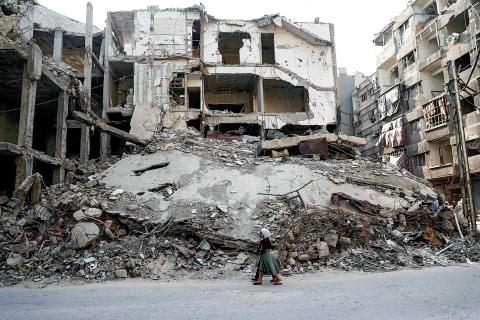Fighting between Syrian rebel and government forces eased yesterday as a Russian-led effort to shore up a ceasefire took effect, although battles continued on an important front line near Hama, a rebel commander and war monitor said.
The deal to make “de-escalation” zones in the major areas of conflict in western Syria took effect at midnight on Friday.
The initiative was proposed by Russia, Syrian President Bashar al-Assad’s most powerful ally, with the support of Turkey, which backs the opposition. Iran, al-Assad’s other major ally, also backed it.

Photo: AFP
Political and armed opposition groups have rejected the proposal, saying Russia has been unwilling or unable to get al-Assad and his Iranian-backed militia allies to respect past ceasefires.
Damascus said it backed the proposal, but added that it would continue to fight what it called terrorist groups across the country.
The Syrian Observatory for Human Rights said there had been a reduction in fighting across Syria since the deal came into force, but warned it was too early to say whether it would last.
“The reduction in violence must be clear and lasting,” observatory director Rami Abdulrahman told reporters.
The rebel commander said the general level of violence was reduced, but added: “Regime attempts [to advance] in the Hama countryside continue.”
With the help of Russia and Iranian-backed militias, the Syrian government has gained the military upper hand in the six-year conflict. The wide array of rebel groups include some supported by Turkey, the US and Persian Gulf monarchies.
The observatory said it had not recorded any deaths as a result of fighting in the four zones since midnight, but there had been some violations.
Breaches were seen mainly in northern Hama Governorate, where Syrian government and allied forces have taken territory from rebels in recent weeks.
Warplanes fired at the rebel-held village of al-Zalakiyat and nearby positions in the northern Hama countryside, where the combatants exchanged shelling, the Britain-based war monitoring group said.
The monitor said government forces shelled the nearby towns of Kafr Zita and al-Latamneh.
There was no immediate comment from the Syrian Army.
Mohammed Rasheed, a spokesman for the Jaish al-Nasr rebel group based in Hama, confirmed that fighting had broken out after midnight.
Rasheed said rebel-held Idlib Governorate to the north of Hama was almost completely quiet, but the attacks, which included barrel bombs, were focused on the northern Hama front line.
“The bombardment has not stopped; it is no different from before,” he told reporters.
Iran and Turkey on Thursday agreed to a Russian proposal for safe zones in Syria. The text of the memorandum was yesterday published by the Russian Ministry of Foreign Affairs.
The agreement said four safe zones would be established in Syria for a period of six months, which could be extended if the three signatory countries agree.
Weaponry and airstrikes were not to be used in those zones by combatants, the text said.
The agreement also included the creation of conditions for humanitarian access, medical assistance and the return of displaced civilians to their homes.

AGING: As of last month, people aged 65 or older accounted for 20.06 percent of the total population and the number of couples who got married fell by 18,685 from 2024 Taiwan has surpassed South Korea as the country least willing to have children, with an annual crude birthrate of 4.62 per 1,000 people, Ministry of the Interior data showed yesterday. The nation was previously ranked the second-lowest country in terms of total fertility rate, or the average number of children a woman has in her lifetime. However, South Korea’s fertility rate began to recover from 2023, with total fertility rate rising from 0.72 and estimated to reach 0.82 to 0.85 by last year, and the crude birthrate projected at 6.7 per 1,000 people. Japan’s crude birthrate was projected to fall below six,

Conflict with Taiwan could leave China with “massive economic disruption, catastrophic military losses, significant social unrest, and devastating sanctions,” a US think tank said in a report released on Monday. The German Marshall Fund released a report titled If China Attacks Taiwan: The Consequences for China of “Minor Conflict” and “Major War” Scenarios. The report details the “massive” economic, military, social and international costs to China in the event of a minor conflict or major war with Taiwan, estimating that the Chinese People’s Liberation Army (PLA) could sustain losses of more than half of its active-duty ground forces, including 100,000 troops. Understanding Chinese

US President Donald Trump in an interview with the New York Times published on Thursday said that “it’s up to” Chinese President Xi Jinping (習近平) what China does on Taiwan, but that he would be “very unhappy” with a change in the “status quo.” “He [Xi] considers it to be a part of China, and that’s up to him what he’s going to be doing, but I’ve expressed to him that I would be very unhappy if he did that, and I don’t think he’ll do that. I hope he doesn’t do that,” Trump said. Trump made the comments in the context

SELF-DEFENSE: Tokyo has accelerated its spending goal and its defense minister said the nation needs to discuss whether it should develop nuclear-powered submarines China is ramping up objections to what it sees as Japan’s desire to acquire nuclear weapons, despite Tokyo’s longstanding renunciation of such arms, deepening another fissure in the two neighbors’ increasingly tense ties. In what appears to be a concerted effort, China’s foreign and defense ministries issued statements on Thursday condemning alleged remilitarism efforts by Tokyo. The remarks came as two of the country’s top think tanks jointly issued a 29-page report framing actions by “right-wing forces” in Japan as posing a “serious threat” to world peace. While that report did not define “right-wing forces,” the Chinese Ministry of Foreign Affairs was